Digital Technology Integration in Crisis Management: City Relay
VerifiedAdded on 2023/06/12
|35
|6863
|211
Case Study
AI Summary
This research project investigates the impact of integrating new digital technology into crisis management, focusing on a case study of City Relay in the hospitality industry. The study aims to identify the concept of integrating digital technology, assess current practices, and discuss the benefits and importance of this integration for managing crises. The research employs both primary and secondary data collection methods, including a questionnaire distributed to City Relay employees. The findings highlight the importance of digital tools like AI and chatbots in enhancing productivity, efficiency, customer engagement, and crisis response within the hospitality sector. The study concludes with recommendations for City Relay and other hospitality organizations to effectively leverage digital technology for improved crisis management strategies, emphasizing the need for proactive planning and adaptation to emerging technologies.

RESEARCH PROJECT
Paraphrase This Document
Need a fresh take? Get an instant paraphrase of this document with our AI Paraphraser
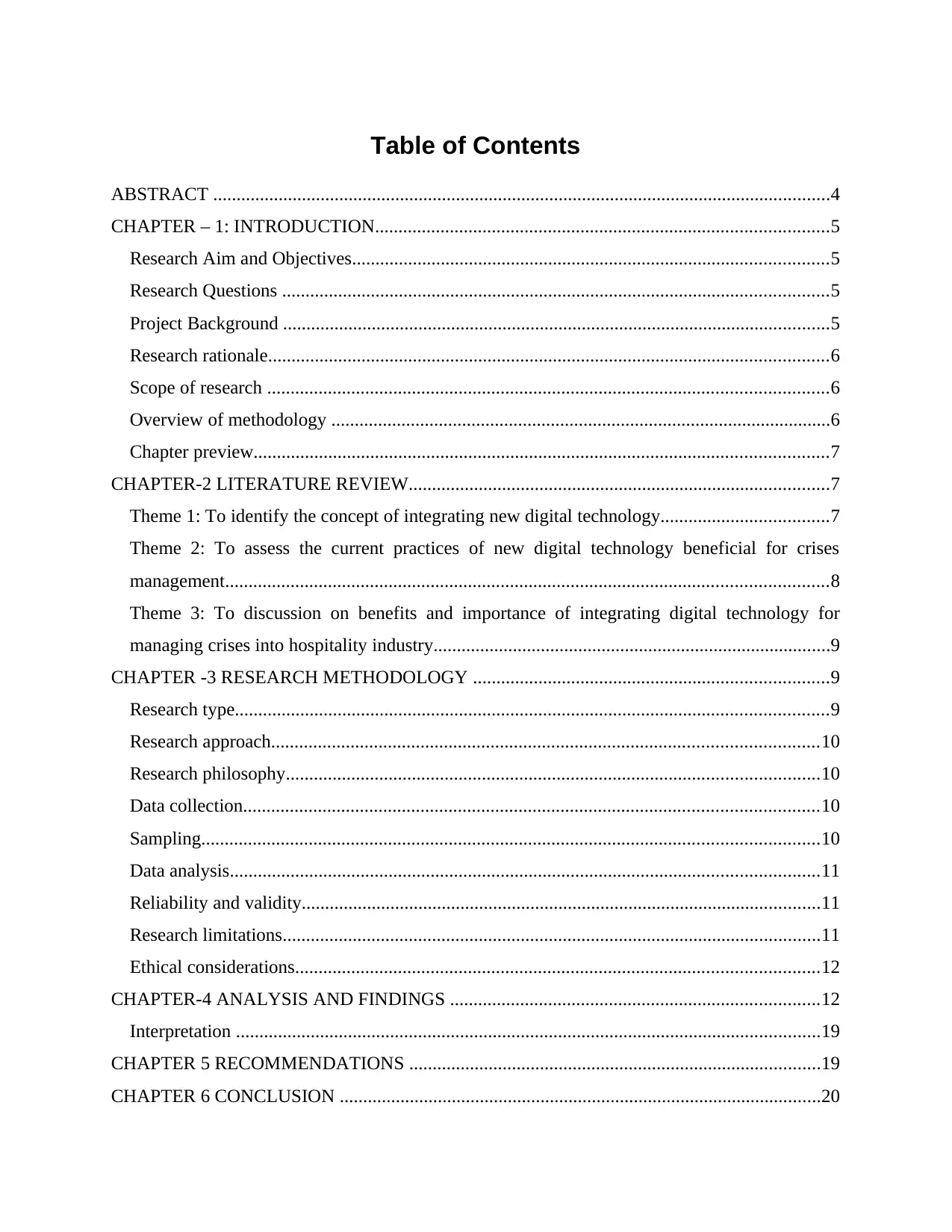
Table of Contents
ABSTRACT ....................................................................................................................................4
CHAPTER – 1: INTRODUCTION.................................................................................................5
Research Aim and Objectives......................................................................................................5
Research Questions .....................................................................................................................5
Project Background .....................................................................................................................5
Research rationale........................................................................................................................6
Scope of research ........................................................................................................................6
Overview of methodology ...........................................................................................................6
Chapter preview...........................................................................................................................7
CHAPTER-2 LITERATURE REVIEW..........................................................................................7
Theme 1: To identify the concept of integrating new digital technology....................................7
Theme 2: To assess the current practices of new digital technology beneficial for crises
management.................................................................................................................................8
Theme 3: To discussion on benefits and importance of integrating digital technology for
managing crises into hospitality industry.....................................................................................9
CHAPTER -3 RESEARCH METHODOLOGY ............................................................................9
Research type...............................................................................................................................9
Research approach.....................................................................................................................10
Research philosophy..................................................................................................................10
Data collection...........................................................................................................................10
Sampling....................................................................................................................................10
Data analysis..............................................................................................................................11
Reliability and validity...............................................................................................................11
Research limitations...................................................................................................................11
Ethical considerations................................................................................................................12
CHAPTER-4 ANALYSIS AND FINDINGS ...............................................................................12
Interpretation .............................................................................................................................19
CHAPTER 5 RECOMMENDATIONS ........................................................................................19
CHAPTER 6 CONCLUSION .......................................................................................................20
ABSTRACT ....................................................................................................................................4
CHAPTER – 1: INTRODUCTION.................................................................................................5
Research Aim and Objectives......................................................................................................5
Research Questions .....................................................................................................................5
Project Background .....................................................................................................................5
Research rationale........................................................................................................................6
Scope of research ........................................................................................................................6
Overview of methodology ...........................................................................................................6
Chapter preview...........................................................................................................................7
CHAPTER-2 LITERATURE REVIEW..........................................................................................7
Theme 1: To identify the concept of integrating new digital technology....................................7
Theme 2: To assess the current practices of new digital technology beneficial for crises
management.................................................................................................................................8
Theme 3: To discussion on benefits and importance of integrating digital technology for
managing crises into hospitality industry.....................................................................................9
CHAPTER -3 RESEARCH METHODOLOGY ............................................................................9
Research type...............................................................................................................................9
Research approach.....................................................................................................................10
Research philosophy..................................................................................................................10
Data collection...........................................................................................................................10
Sampling....................................................................................................................................10
Data analysis..............................................................................................................................11
Reliability and validity...............................................................................................................11
Research limitations...................................................................................................................11
Ethical considerations................................................................................................................12
CHAPTER-4 ANALYSIS AND FINDINGS ...............................................................................12
Interpretation .............................................................................................................................19
CHAPTER 5 RECOMMENDATIONS ........................................................................................19
CHAPTER 6 CONCLUSION .......................................................................................................20
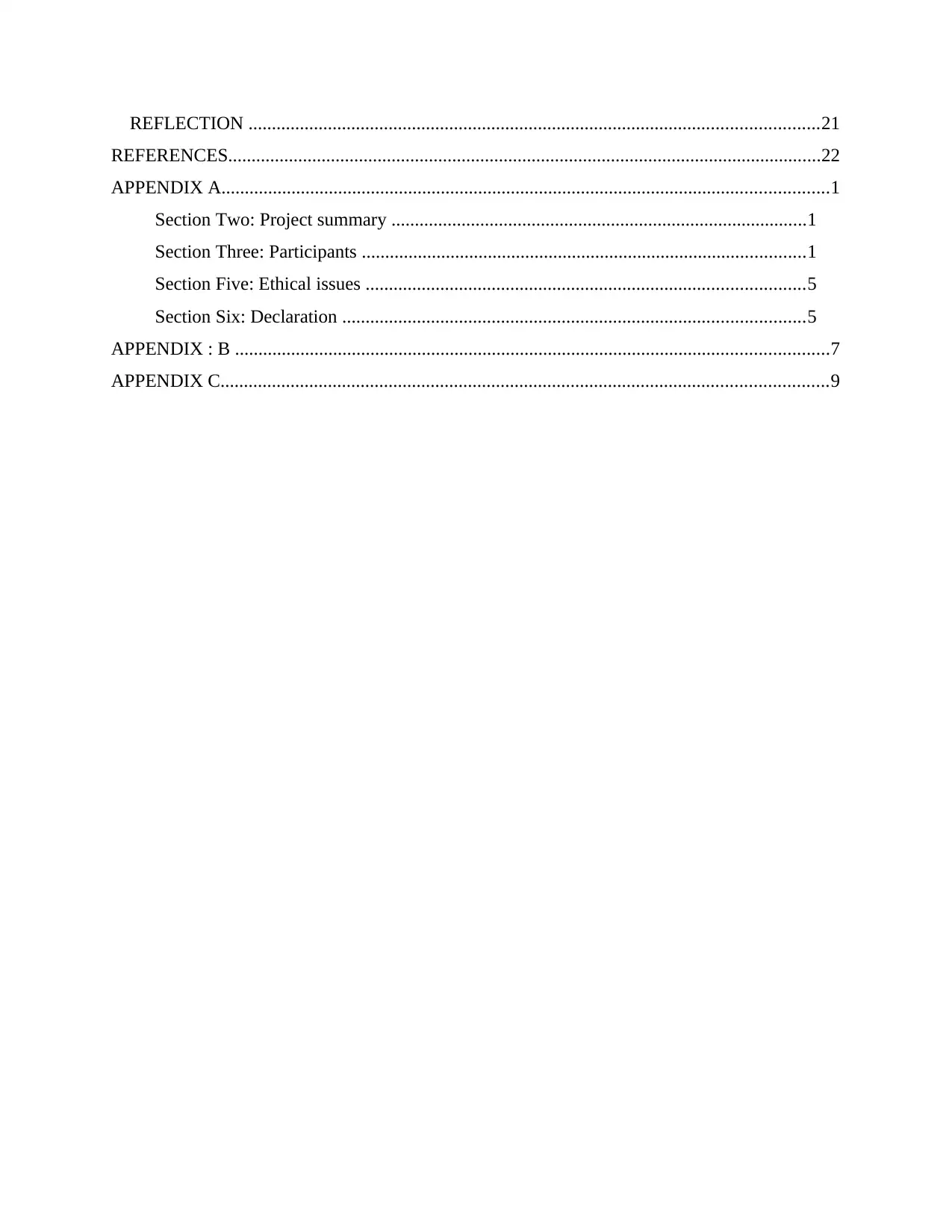
REFLECTION ..........................................................................................................................21
REFERENCES...............................................................................................................................22
APPENDIX A..................................................................................................................................1
Section Two: Project summary .........................................................................................1
Section Three: Participants ...............................................................................................1
Section Five: Ethical issues ..............................................................................................5
Section Six: Declaration ...................................................................................................5
APPENDIX : B ...............................................................................................................................7
APPENDIX C..................................................................................................................................9
REFERENCES...............................................................................................................................22
APPENDIX A..................................................................................................................................1
Section Two: Project summary .........................................................................................1
Section Three: Participants ...............................................................................................1
Section Five: Ethical issues ..............................................................................................5
Section Six: Declaration ...................................................................................................5
APPENDIX : B ...............................................................................................................................7
APPENDIX C..................................................................................................................................9
⊘ This is a preview!⊘
Do you want full access?
Subscribe today to unlock all pages.

Trusted by 1+ million students worldwide
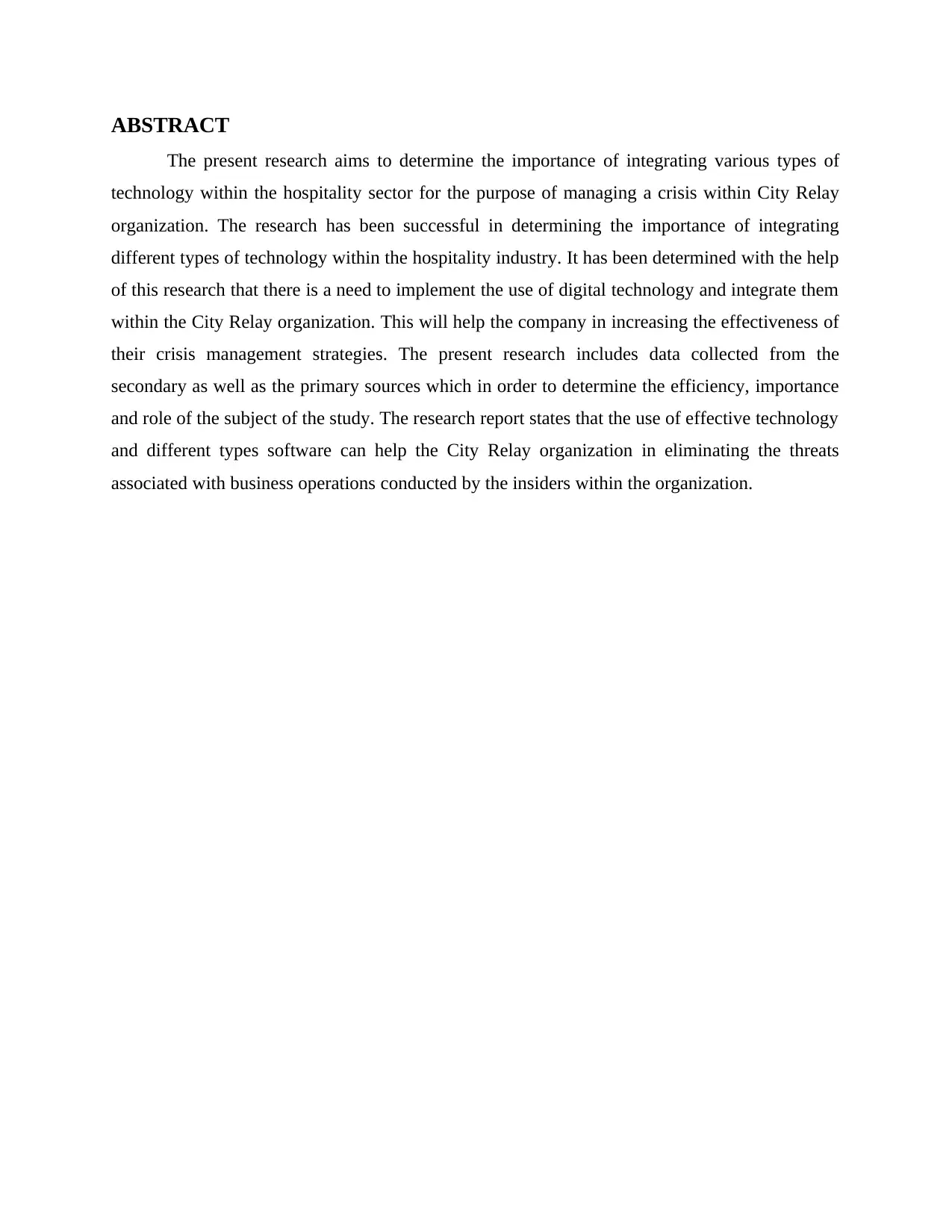
ABSTRACT
The present research aims to determine the importance of integrating various types of
technology within the hospitality sector for the purpose of managing a crisis within City Relay
organization. The research has been successful in determining the importance of integrating
different types of technology within the hospitality industry. It has been determined with the help
of this research that there is a need to implement the use of digital technology and integrate them
within the City Relay organization. This will help the company in increasing the effectiveness of
their crisis management strategies. The present research includes data collected from the
secondary as well as the primary sources which in order to determine the efficiency, importance
and role of the subject of the study. The research report states that the use of effective technology
and different types software can help the City Relay organization in eliminating the threats
associated with business operations conducted by the insiders within the organization.
The present research aims to determine the importance of integrating various types of
technology within the hospitality sector for the purpose of managing a crisis within City Relay
organization. The research has been successful in determining the importance of integrating
different types of technology within the hospitality industry. It has been determined with the help
of this research that there is a need to implement the use of digital technology and integrate them
within the City Relay organization. This will help the company in increasing the effectiveness of
their crisis management strategies. The present research includes data collected from the
secondary as well as the primary sources which in order to determine the efficiency, importance
and role of the subject of the study. The research report states that the use of effective technology
and different types software can help the City Relay organization in eliminating the threats
associated with business operations conducted by the insiders within the organization.
Paraphrase This Document
Need a fresh take? Get an instant paraphrase of this document with our AI Paraphraser
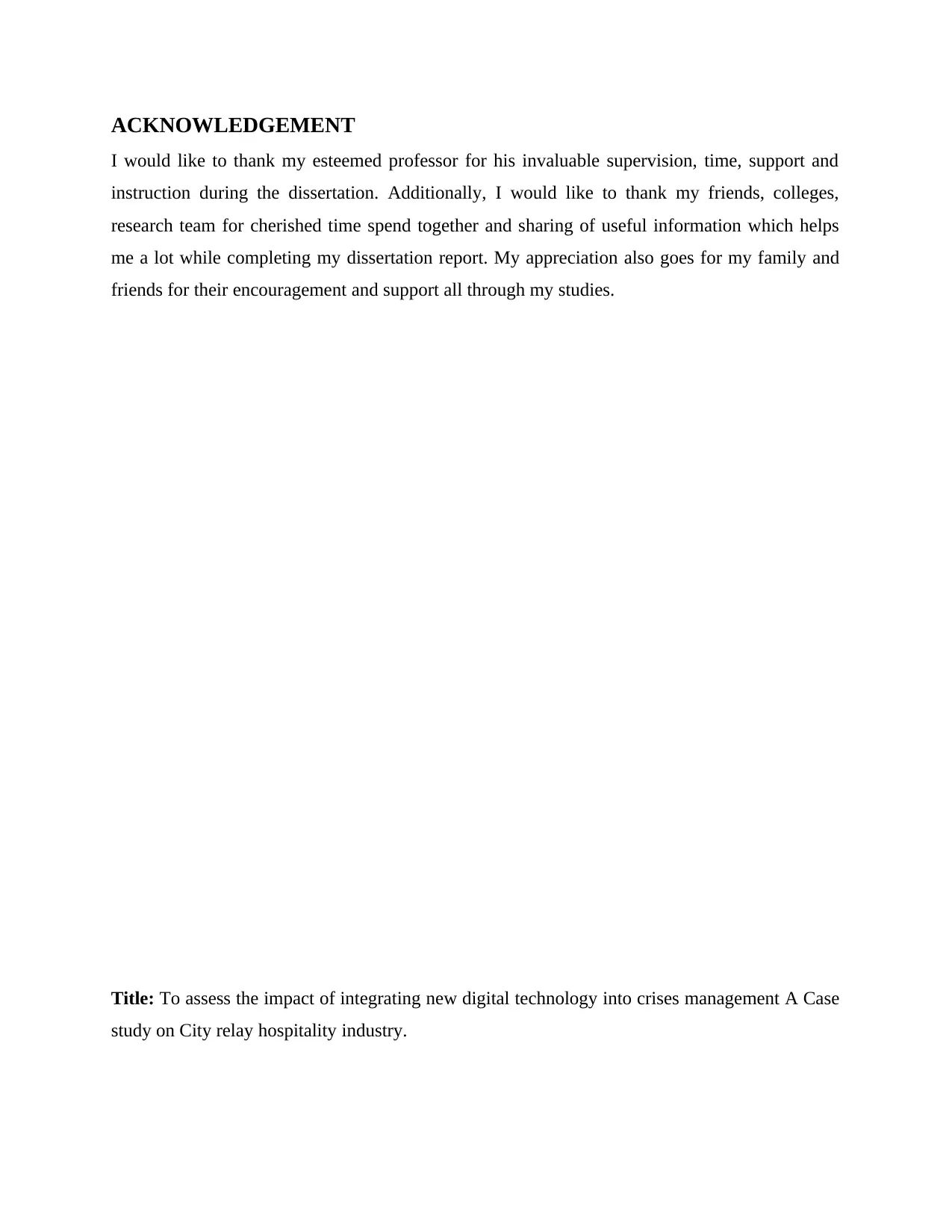
ACKNOWLEDGEMENT
I would like to thank my esteemed professor for his invaluable supervision, time, support and
instruction during the dissertation. Additionally, I would like to thank my friends, colleges,
research team for cherished time spend together and sharing of useful information which helps
me a lot while completing my dissertation report. My appreciation also goes for my family and
friends for their encouragement and support all through my studies.
Title: To assess the impact of integrating new digital technology into crises management A Case
study on City relay hospitality industry.
I would like to thank my esteemed professor for his invaluable supervision, time, support and
instruction during the dissertation. Additionally, I would like to thank my friends, colleges,
research team for cherished time spend together and sharing of useful information which helps
me a lot while completing my dissertation report. My appreciation also goes for my family and
friends for their encouragement and support all through my studies.
Title: To assess the impact of integrating new digital technology into crises management A Case
study on City relay hospitality industry.
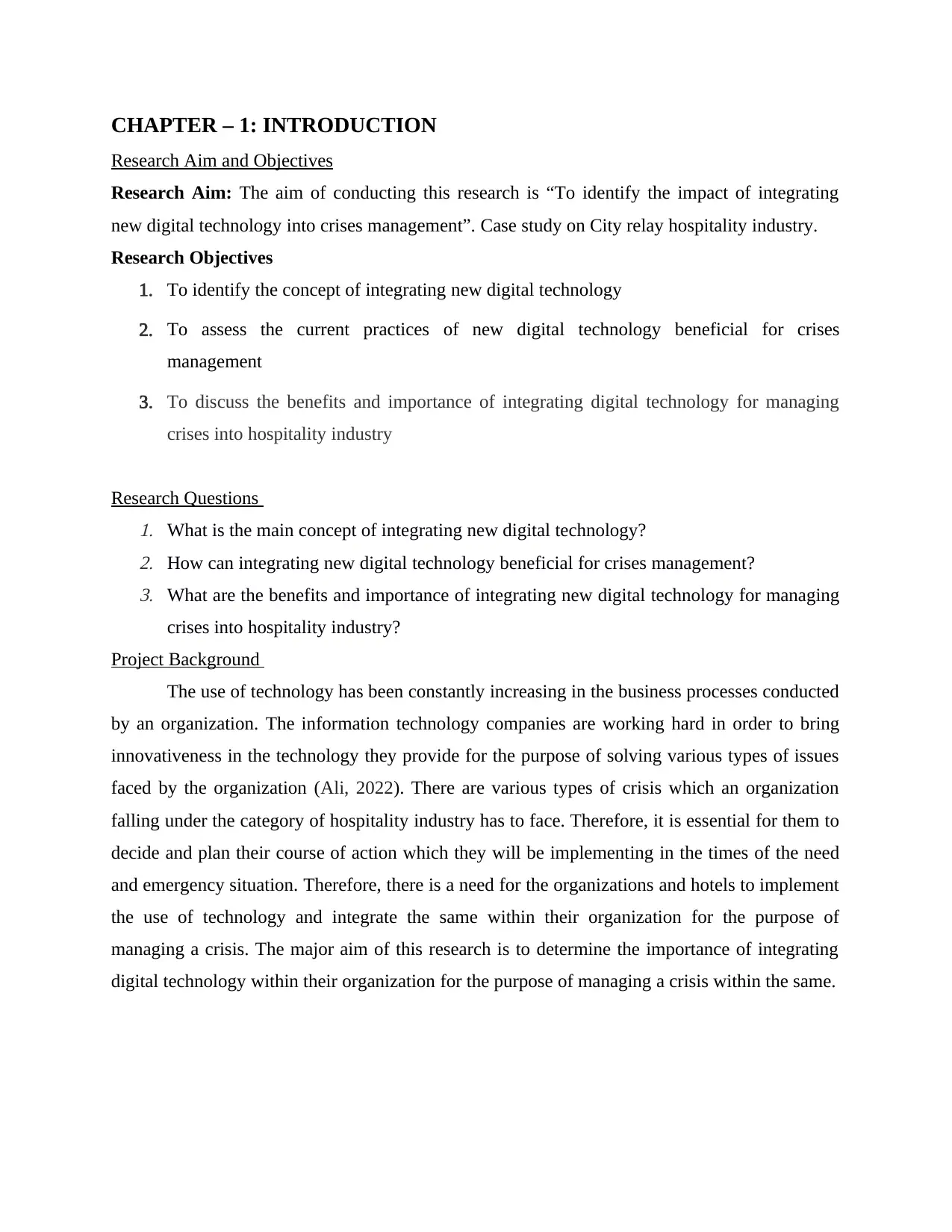
CHAPTER – 1: INTRODUCTION
Research Aim and Objectives
Research Aim: The aim of conducting this research is “To identify the impact of integrating
new digital technology into crises management”. Case study on City relay hospitality industry.
Research Objectives
1. To identify the concept of integrating new digital technology
2. To assess the current practices of new digital technology beneficial for crises
management
3. To discuss the benefits and importance of integrating digital technology for managing
crises into hospitality industry
Research Questions1. What is the main concept of integrating new digital technology?2. How can integrating new digital technology beneficial for crises management?3. What are the benefits and importance of integrating new digital technology for managing
crises into hospitality industry?
Project Background
The use of technology has been constantly increasing in the business processes conducted
by an organization. The information technology companies are working hard in order to bring
innovativeness in the technology they provide for the purpose of solving various types of issues
faced by the organization (Ali, 2022). There are various types of crisis which an organization
falling under the category of hospitality industry has to face. Therefore, it is essential for them to
decide and plan their course of action which they will be implementing in the times of the need
and emergency situation. Therefore, there is a need for the organizations and hotels to implement
the use of technology and integrate the same within their organization for the purpose of
managing a crisis. The major aim of this research is to determine the importance of integrating
digital technology within their organization for the purpose of managing a crisis within the same.
Research Aim and Objectives
Research Aim: The aim of conducting this research is “To identify the impact of integrating
new digital technology into crises management”. Case study on City relay hospitality industry.
Research Objectives
1. To identify the concept of integrating new digital technology
2. To assess the current practices of new digital technology beneficial for crises
management
3. To discuss the benefits and importance of integrating digital technology for managing
crises into hospitality industry
Research Questions1. What is the main concept of integrating new digital technology?2. How can integrating new digital technology beneficial for crises management?3. What are the benefits and importance of integrating new digital technology for managing
crises into hospitality industry?
Project Background
The use of technology has been constantly increasing in the business processes conducted
by an organization. The information technology companies are working hard in order to bring
innovativeness in the technology they provide for the purpose of solving various types of issues
faced by the organization (Ali, 2022). There are various types of crisis which an organization
falling under the category of hospitality industry has to face. Therefore, it is essential for them to
decide and plan their course of action which they will be implementing in the times of the need
and emergency situation. Therefore, there is a need for the organizations and hotels to implement
the use of technology and integrate the same within their organization for the purpose of
managing a crisis. The major aim of this research is to determine the importance of integrating
digital technology within their organization for the purpose of managing a crisis within the same.
⊘ This is a preview!⊘
Do you want full access?
Subscribe today to unlock all pages.

Trusted by 1+ million students worldwide
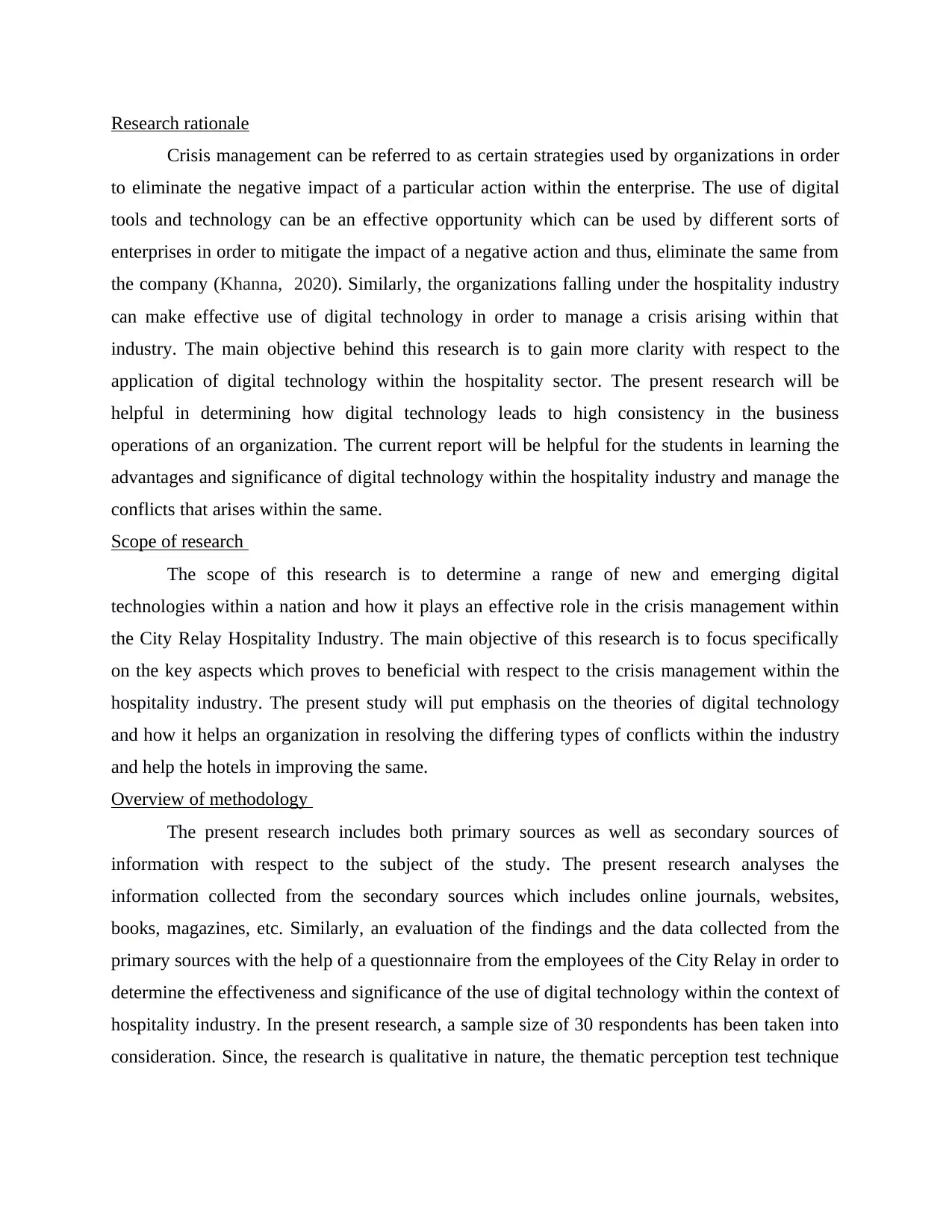
Research rationale
Crisis management can be referred to as certain strategies used by organizations in order
to eliminate the negative impact of a particular action within the enterprise. The use of digital
tools and technology can be an effective opportunity which can be used by different sorts of
enterprises in order to mitigate the impact of a negative action and thus, eliminate the same from
the company (Khanna, 2020). Similarly, the organizations falling under the hospitality industry
can make effective use of digital technology in order to manage a crisis arising within that
industry. The main objective behind this research is to gain more clarity with respect to the
application of digital technology within the hospitality sector. The present research will be
helpful in determining how digital technology leads to high consistency in the business
operations of an organization. The current report will be helpful for the students in learning the
advantages and significance of digital technology within the hospitality industry and manage the
conflicts that arises within the same.
Scope of research
The scope of this research is to determine a range of new and emerging digital
technologies within a nation and how it plays an effective role in the crisis management within
the City Relay Hospitality Industry. The main objective of this research is to focus specifically
on the key aspects which proves to beneficial with respect to the crisis management within the
hospitality industry. The present study will put emphasis on the theories of digital technology
and how it helps an organization in resolving the differing types of conflicts within the industry
and help the hotels in improving the same.
Overview of methodology
The present research includes both primary sources as well as secondary sources of
information with respect to the subject of the study. The present research analyses the
information collected from the secondary sources which includes online journals, websites,
books, magazines, etc. Similarly, an evaluation of the findings and the data collected from the
primary sources with the help of a questionnaire from the employees of the City Relay in order to
determine the effectiveness and significance of the use of digital technology within the context of
hospitality industry. In the present research, a sample size of 30 respondents has been taken into
consideration. Since, the research is qualitative in nature, the thematic perception test technique
Crisis management can be referred to as certain strategies used by organizations in order
to eliminate the negative impact of a particular action within the enterprise. The use of digital
tools and technology can be an effective opportunity which can be used by different sorts of
enterprises in order to mitigate the impact of a negative action and thus, eliminate the same from
the company (Khanna, 2020). Similarly, the organizations falling under the hospitality industry
can make effective use of digital technology in order to manage a crisis arising within that
industry. The main objective behind this research is to gain more clarity with respect to the
application of digital technology within the hospitality sector. The present research will be
helpful in determining how digital technology leads to high consistency in the business
operations of an organization. The current report will be helpful for the students in learning the
advantages and significance of digital technology within the hospitality industry and manage the
conflicts that arises within the same.
Scope of research
The scope of this research is to determine a range of new and emerging digital
technologies within a nation and how it plays an effective role in the crisis management within
the City Relay Hospitality Industry. The main objective of this research is to focus specifically
on the key aspects which proves to beneficial with respect to the crisis management within the
hospitality industry. The present study will put emphasis on the theories of digital technology
and how it helps an organization in resolving the differing types of conflicts within the industry
and help the hotels in improving the same.
Overview of methodology
The present research includes both primary sources as well as secondary sources of
information with respect to the subject of the study. The present research analyses the
information collected from the secondary sources which includes online journals, websites,
books, magazines, etc. Similarly, an evaluation of the findings and the data collected from the
primary sources with the help of a questionnaire from the employees of the City Relay in order to
determine the effectiveness and significance of the use of digital technology within the context of
hospitality industry. In the present research, a sample size of 30 respondents has been taken into
consideration. Since, the research is qualitative in nature, the thematic perception test technique
Paraphrase This Document
Need a fresh take? Get an instant paraphrase of this document with our AI Paraphraser
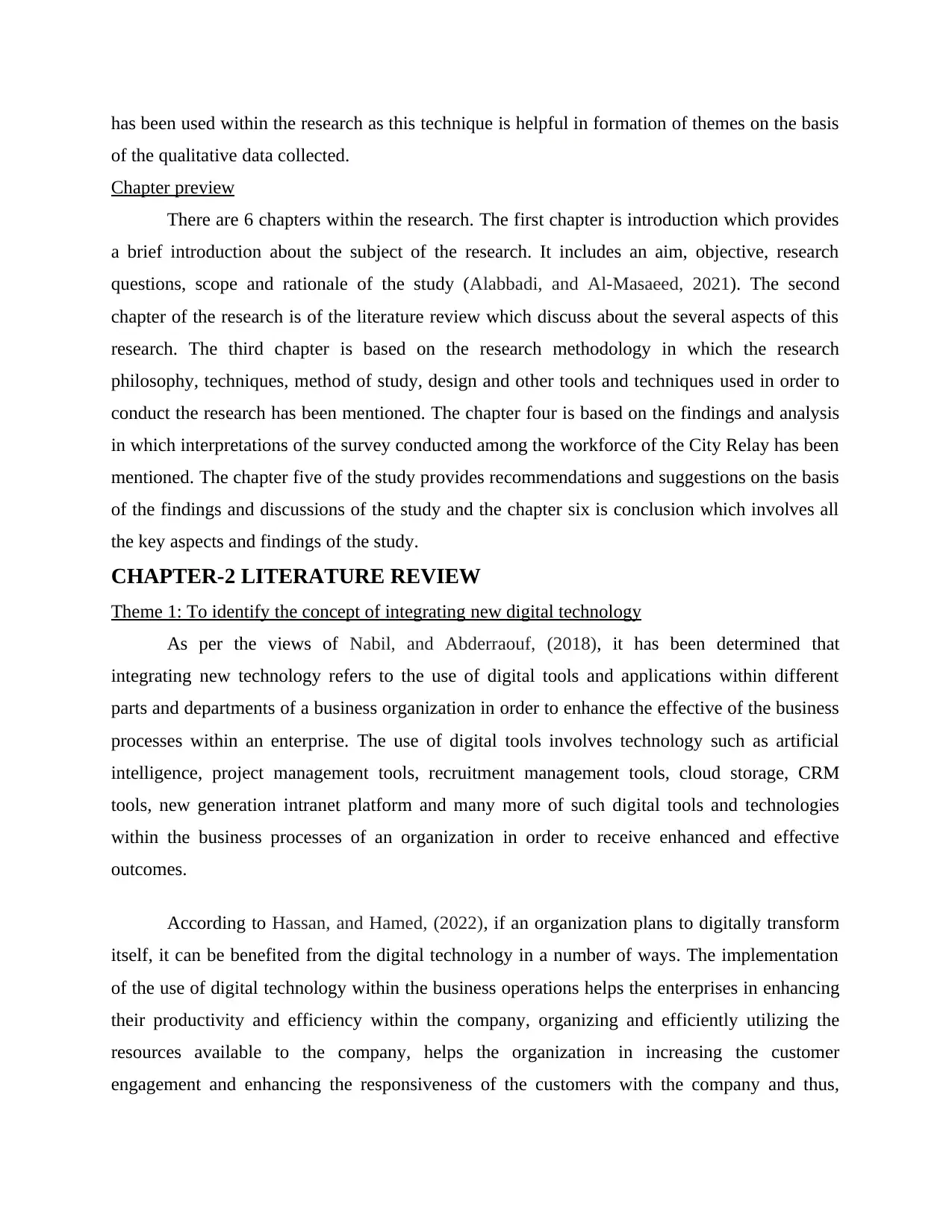
has been used within the research as this technique is helpful in formation of themes on the basis
of the qualitative data collected.
Chapter preview
There are 6 chapters within the research. The first chapter is introduction which provides
a brief introduction about the subject of the research. It includes an aim, objective, research
questions, scope and rationale of the study (Alabbadi, and Al-Masaeed, 2021). The second
chapter of the research is of the literature review which discuss about the several aspects of this
research. The third chapter is based on the research methodology in which the research
philosophy, techniques, method of study, design and other tools and techniques used in order to
conduct the research has been mentioned. The chapter four is based on the findings and analysis
in which interpretations of the survey conducted among the workforce of the City Relay has been
mentioned. The chapter five of the study provides recommendations and suggestions on the basis
of the findings and discussions of the study and the chapter six is conclusion which involves all
the key aspects and findings of the study.
CHAPTER-2 LITERATURE REVIEW
Theme 1: To identify the concept of integrating new digital technology
As per the views of Nabil, and Abderraouf, (2018), it has been determined that
integrating new technology refers to the use of digital tools and applications within different
parts and departments of a business organization in order to enhance the effective of the business
processes within an enterprise. The use of digital tools involves technology such as artificial
intelligence, project management tools, recruitment management tools, cloud storage, CRM
tools, new generation intranet platform and many more of such digital tools and technologies
within the business processes of an organization in order to receive enhanced and effective
outcomes.
According to Hassan, and Hamed, (2022), if an organization plans to digitally transform
itself, it can be benefited from the digital technology in a number of ways. The implementation
of the use of digital technology within the business operations helps the enterprises in enhancing
their productivity and efficiency within the company, organizing and efficiently utilizing the
resources available to the company, helps the organization in increasing the customer
engagement and enhancing the responsiveness of the customers with the company and thus,
of the qualitative data collected.
Chapter preview
There are 6 chapters within the research. The first chapter is introduction which provides
a brief introduction about the subject of the research. It includes an aim, objective, research
questions, scope and rationale of the study (Alabbadi, and Al-Masaeed, 2021). The second
chapter of the research is of the literature review which discuss about the several aspects of this
research. The third chapter is based on the research methodology in which the research
philosophy, techniques, method of study, design and other tools and techniques used in order to
conduct the research has been mentioned. The chapter four is based on the findings and analysis
in which interpretations of the survey conducted among the workforce of the City Relay has been
mentioned. The chapter five of the study provides recommendations and suggestions on the basis
of the findings and discussions of the study and the chapter six is conclusion which involves all
the key aspects and findings of the study.
CHAPTER-2 LITERATURE REVIEW
Theme 1: To identify the concept of integrating new digital technology
As per the views of Nabil, and Abderraouf, (2018), it has been determined that
integrating new technology refers to the use of digital tools and applications within different
parts and departments of a business organization in order to enhance the effective of the business
processes within an enterprise. The use of digital tools involves technology such as artificial
intelligence, project management tools, recruitment management tools, cloud storage, CRM
tools, new generation intranet platform and many more of such digital tools and technologies
within the business processes of an organization in order to receive enhanced and effective
outcomes.
According to Hassan, and Hamed, (2022), if an organization plans to digitally transform
itself, it can be benefited from the digital technology in a number of ways. The implementation
of the use of digital technology within the business operations helps the enterprises in enhancing
their productivity and efficiency within the company, organizing and efficiently utilizing the
resources available to the company, helps the organization in increasing the customer
engagement and enhancing the responsiveness of the customers with the company and thus,

helps the company in increasing their revenue and profitability of the company. When
organizations automate the business processes within a company, it helps the companies in
saving a lot of time and utilizing the same in the development of new and innovative strategies
which can be found helpful in increasing the effectiveness of the company. Similarly, the use of
chat bots and other tools which are developed as a result of using the artificial intelligence within
the organizations helps a company in easing the business processes within the company and
increasing the efficiency of the employees which in turns helps in increasing the customer
engagement with the products and services offered by the organization.
Theme 2: To assess the current practices of new digital technology beneficial for crises
management
As investigated by Hetu, and et.al (2018), it has been identified that there is wide range of
technology which is used by hospitality industry for the purpose of managing a crisis within the
hotels. The digital technology includes the use of chatbots, self-service kiosks, artificial
intelligence, industry robots, internet of things, voice and face recognition technologies. In
today’s time, the hotels and the hospitality industry make effective use of artificial intelligence in
order manage a range of activities. The hospitality industry makes use of artificial intelligence
for the purpose of checking on the guests, room service and answering to the questions of the
customers. This helps the hospitality sector to manage and solve the issues faced by the
customers and thus helps them in managing a crisis. The artificial intelligence is also used by the
hospitality sector for the purpose of enhancing the customer experience with respect to bookings.
For the same, the hotels use AI in order to automate and integrate their functions within all the
departments. This helps them in saving their time, cost and increases the customer experience
and satisfaction with the hotels and helps then in saving themselves from a crisis by increasing
their revenue.
According to Guembour, and Raki, (2020), the chatbots are also considered as one of the
most important tools which helps the hotel industry during the times of a crisis. For instance, at
the time of sudden outbreak of COVID 19, the hospitality industry had to take certain steps in
order to safeguard the interest of customers and ensure their health and safety. Since, the
COVID19 was spreading very quickly all over the world, the government of different nations
were constantly issuing guidelines which needed to be followed by different industries within the
organizations automate the business processes within a company, it helps the companies in
saving a lot of time and utilizing the same in the development of new and innovative strategies
which can be found helpful in increasing the effectiveness of the company. Similarly, the use of
chat bots and other tools which are developed as a result of using the artificial intelligence within
the organizations helps a company in easing the business processes within the company and
increasing the efficiency of the employees which in turns helps in increasing the customer
engagement with the products and services offered by the organization.
Theme 2: To assess the current practices of new digital technology beneficial for crises
management
As investigated by Hetu, and et.al (2018), it has been identified that there is wide range of
technology which is used by hospitality industry for the purpose of managing a crisis within the
hotels. The digital technology includes the use of chatbots, self-service kiosks, artificial
intelligence, industry robots, internet of things, voice and face recognition technologies. In
today’s time, the hotels and the hospitality industry make effective use of artificial intelligence in
order manage a range of activities. The hospitality industry makes use of artificial intelligence
for the purpose of checking on the guests, room service and answering to the questions of the
customers. This helps the hospitality sector to manage and solve the issues faced by the
customers and thus helps them in managing a crisis. The artificial intelligence is also used by the
hospitality sector for the purpose of enhancing the customer experience with respect to bookings.
For the same, the hotels use AI in order to automate and integrate their functions within all the
departments. This helps them in saving their time, cost and increases the customer experience
and satisfaction with the hotels and helps then in saving themselves from a crisis by increasing
their revenue.
According to Guembour, and Raki, (2020), the chatbots are also considered as one of the
most important tools which helps the hotel industry during the times of a crisis. For instance, at
the time of sudden outbreak of COVID 19, the hospitality industry had to take certain steps in
order to safeguard the interest of customers and ensure their health and safety. Since, the
COVID19 was spreading very quickly all over the world, the government of different nations
were constantly issuing guidelines which needed to be followed by different industries within the
⊘ This is a preview!⊘
Do you want full access?
Subscribe today to unlock all pages.

Trusted by 1+ million students worldwide
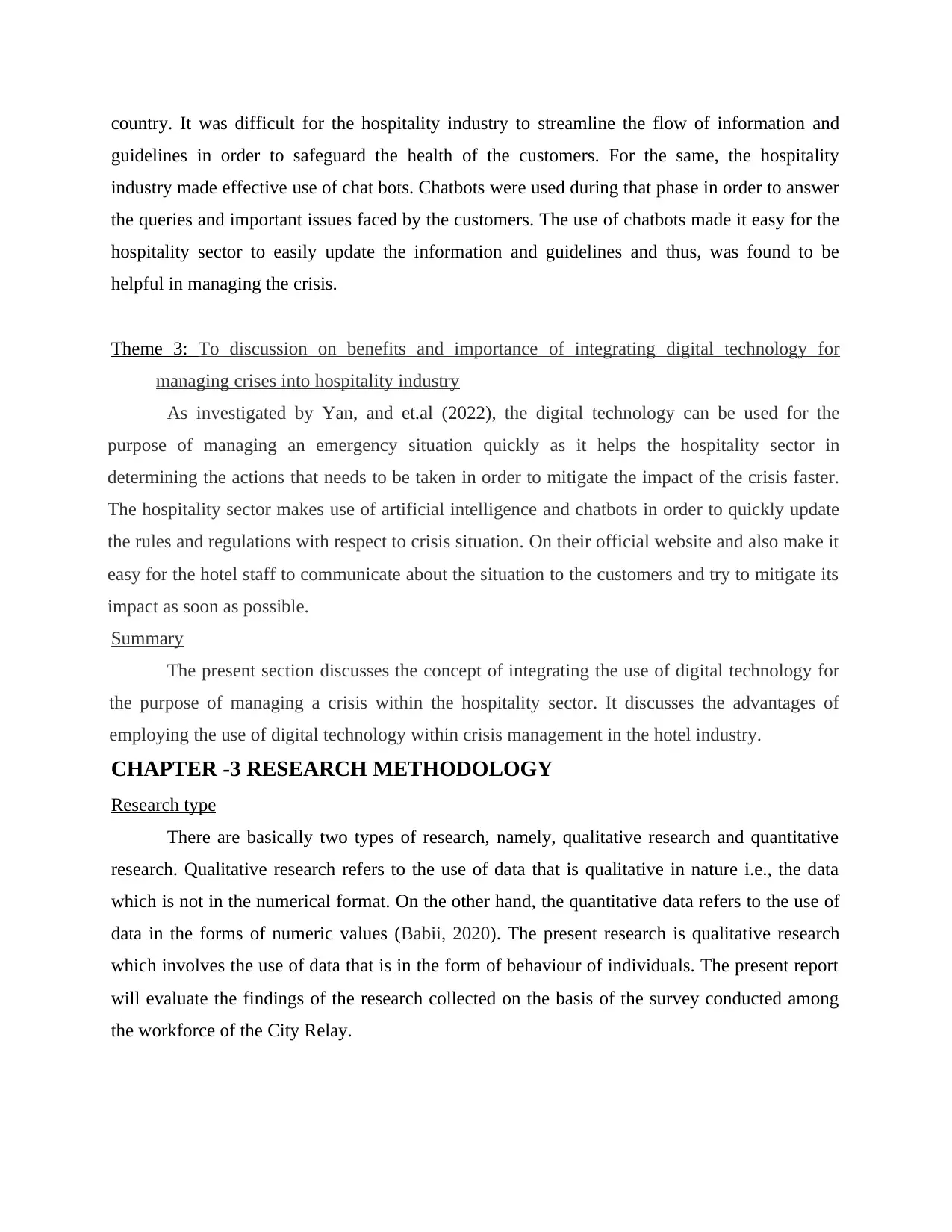
country. It was difficult for the hospitality industry to streamline the flow of information and
guidelines in order to safeguard the health of the customers. For the same, the hospitality
industry made effective use of chat bots. Chatbots were used during that phase in order to answer
the queries and important issues faced by the customers. The use of chatbots made it easy for the
hospitality sector to easily update the information and guidelines and thus, was found to be
helpful in managing the crisis.
Theme 3: To discussion on benefits and importance of integrating digital technology for
managing crises into hospitality industry
As investigated by Yan, and et.al (2022), the digital technology can be used for the
purpose of managing an emergency situation quickly as it helps the hospitality sector in
determining the actions that needs to be taken in order to mitigate the impact of the crisis faster.
The hospitality sector makes use of artificial intelligence and chatbots in order to quickly update
the rules and regulations with respect to crisis situation. On their official website and also make it
easy for the hotel staff to communicate about the situation to the customers and try to mitigate its
impact as soon as possible.
Summary
The present section discusses the concept of integrating the use of digital technology for
the purpose of managing a crisis within the hospitality sector. It discusses the advantages of
employing the use of digital technology within crisis management in the hotel industry.
CHAPTER -3 RESEARCH METHODOLOGY
Research type
There are basically two types of research, namely, qualitative research and quantitative
research. Qualitative research refers to the use of data that is qualitative in nature i.e., the data
which is not in the numerical format. On the other hand, the quantitative data refers to the use of
data in the forms of numeric values (Babii, 2020). The present research is qualitative research
which involves the use of data that is in the form of behaviour of individuals. The present report
will evaluate the findings of the research collected on the basis of the survey conducted among
the workforce of the City Relay.
guidelines in order to safeguard the health of the customers. For the same, the hospitality
industry made effective use of chat bots. Chatbots were used during that phase in order to answer
the queries and important issues faced by the customers. The use of chatbots made it easy for the
hospitality sector to easily update the information and guidelines and thus, was found to be
helpful in managing the crisis.
Theme 3: To discussion on benefits and importance of integrating digital technology for
managing crises into hospitality industry
As investigated by Yan, and et.al (2022), the digital technology can be used for the
purpose of managing an emergency situation quickly as it helps the hospitality sector in
determining the actions that needs to be taken in order to mitigate the impact of the crisis faster.
The hospitality sector makes use of artificial intelligence and chatbots in order to quickly update
the rules and regulations with respect to crisis situation. On their official website and also make it
easy for the hotel staff to communicate about the situation to the customers and try to mitigate its
impact as soon as possible.
Summary
The present section discusses the concept of integrating the use of digital technology for
the purpose of managing a crisis within the hospitality sector. It discusses the advantages of
employing the use of digital technology within crisis management in the hotel industry.
CHAPTER -3 RESEARCH METHODOLOGY
Research type
There are basically two types of research, namely, qualitative research and quantitative
research. Qualitative research refers to the use of data that is qualitative in nature i.e., the data
which is not in the numerical format. On the other hand, the quantitative data refers to the use of
data in the forms of numeric values (Babii, 2020). The present research is qualitative research
which involves the use of data that is in the form of behaviour of individuals. The present report
will evaluate the findings of the research collected on the basis of the survey conducted among
the workforce of the City Relay.
Paraphrase This Document
Need a fresh take? Get an instant paraphrase of this document with our AI Paraphraser
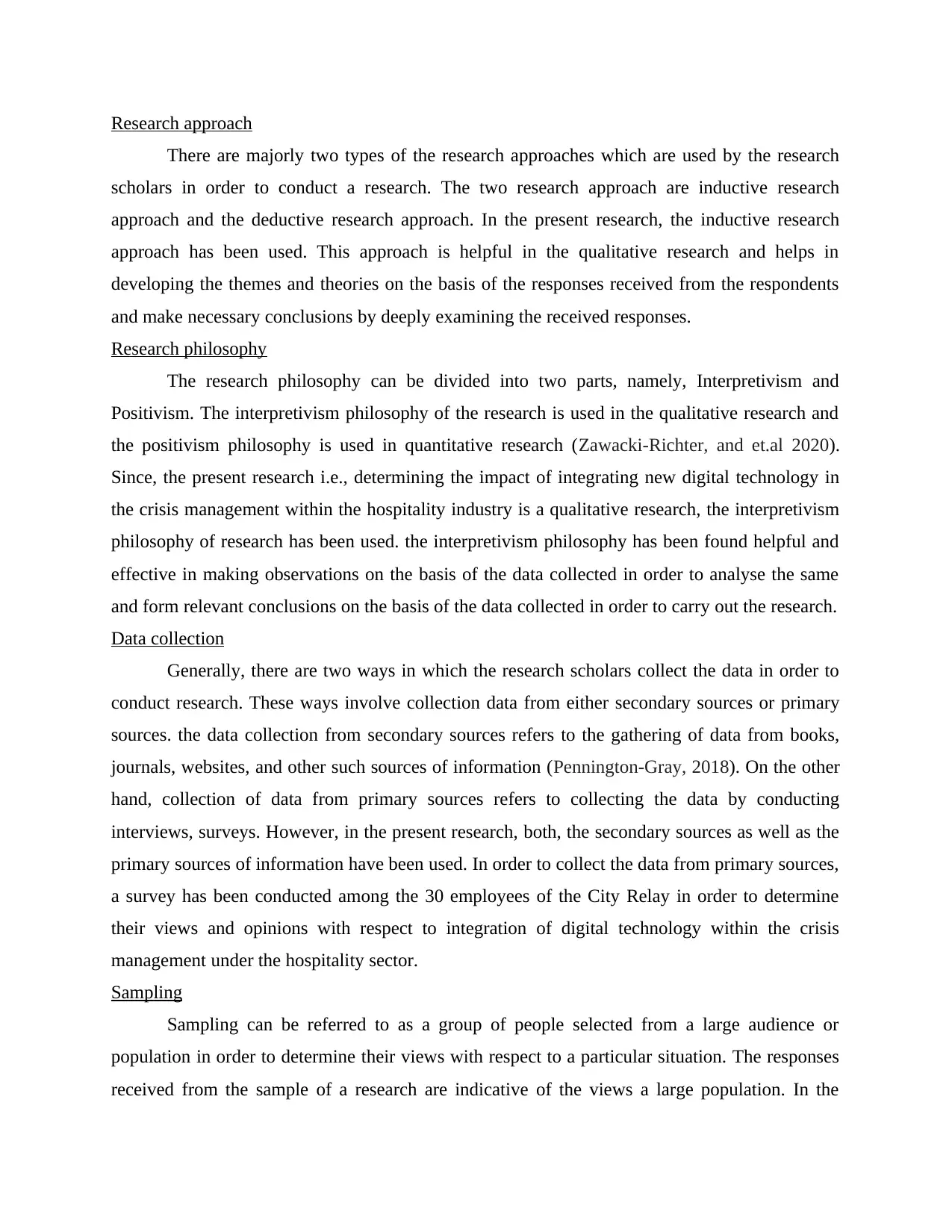
Research approach
There are majorly two types of the research approaches which are used by the research
scholars in order to conduct a research. The two research approach are inductive research
approach and the deductive research approach. In the present research, the inductive research
approach has been used. This approach is helpful in the qualitative research and helps in
developing the themes and theories on the basis of the responses received from the respondents
and make necessary conclusions by deeply examining the received responses.
Research philosophy
The research philosophy can be divided into two parts, namely, Interpretivism and
Positivism. The interpretivism philosophy of the research is used in the qualitative research and
the positivism philosophy is used in quantitative research (Zawacki-Richter, and et.al 2020).
Since, the present research i.e., determining the impact of integrating new digital technology in
the crisis management within the hospitality industry is a qualitative research, the interpretivism
philosophy of research has been used. the interpretivism philosophy has been found helpful and
effective in making observations on the basis of the data collected in order to analyse the same
and form relevant conclusions on the basis of the data collected in order to carry out the research.
Data collection
Generally, there are two ways in which the research scholars collect the data in order to
conduct research. These ways involve collection data from either secondary sources or primary
sources. the data collection from secondary sources refers to the gathering of data from books,
journals, websites, and other such sources of information (Pennington-Gray, 2018). On the other
hand, collection of data from primary sources refers to collecting the data by conducting
interviews, surveys. However, in the present research, both, the secondary sources as well as the
primary sources of information have been used. In order to collect the data from primary sources,
a survey has been conducted among the 30 employees of the City Relay in order to determine
their views and opinions with respect to integration of digital technology within the crisis
management under the hospitality sector.
Sampling
Sampling can be referred to as a group of people selected from a large audience or
population in order to determine their views with respect to a particular situation. The responses
received from the sample of a research are indicative of the views a large population. In the
There are majorly two types of the research approaches which are used by the research
scholars in order to conduct a research. The two research approach are inductive research
approach and the deductive research approach. In the present research, the inductive research
approach has been used. This approach is helpful in the qualitative research and helps in
developing the themes and theories on the basis of the responses received from the respondents
and make necessary conclusions by deeply examining the received responses.
Research philosophy
The research philosophy can be divided into two parts, namely, Interpretivism and
Positivism. The interpretivism philosophy of the research is used in the qualitative research and
the positivism philosophy is used in quantitative research (Zawacki-Richter, and et.al 2020).
Since, the present research i.e., determining the impact of integrating new digital technology in
the crisis management within the hospitality industry is a qualitative research, the interpretivism
philosophy of research has been used. the interpretivism philosophy has been found helpful and
effective in making observations on the basis of the data collected in order to analyse the same
and form relevant conclusions on the basis of the data collected in order to carry out the research.
Data collection
Generally, there are two ways in which the research scholars collect the data in order to
conduct research. These ways involve collection data from either secondary sources or primary
sources. the data collection from secondary sources refers to the gathering of data from books,
journals, websites, and other such sources of information (Pennington-Gray, 2018). On the other
hand, collection of data from primary sources refers to collecting the data by conducting
interviews, surveys. However, in the present research, both, the secondary sources as well as the
primary sources of information have been used. In order to collect the data from primary sources,
a survey has been conducted among the 30 employees of the City Relay in order to determine
their views and opinions with respect to integration of digital technology within the crisis
management under the hospitality sector.
Sampling
Sampling can be referred to as a group of people selected from a large audience or
population in order to determine their views with respect to a particular situation. The responses
received from the sample of a research are indicative of the views a large population. In the
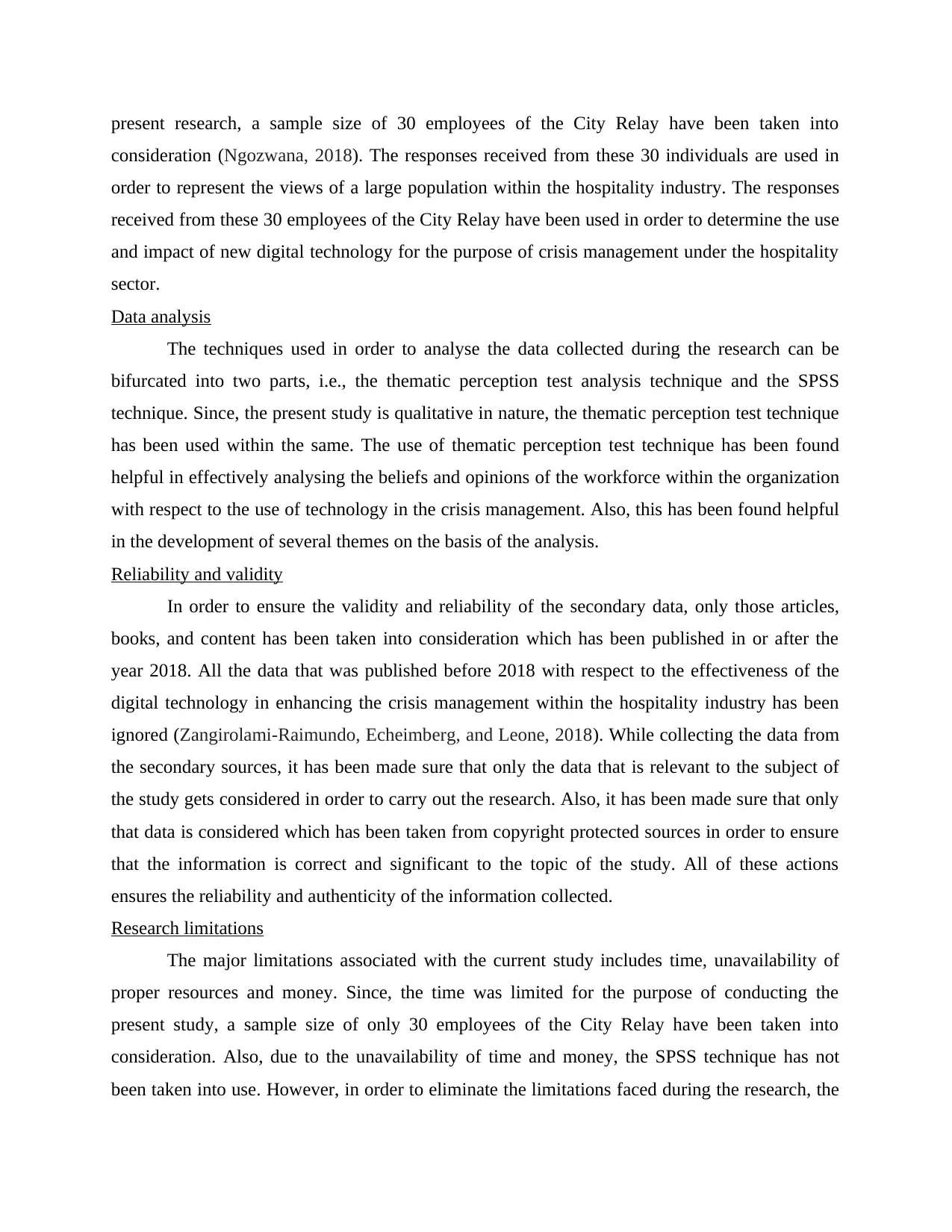
present research, a sample size of 30 employees of the City Relay have been taken into
consideration (Ngozwana, 2018). The responses received from these 30 individuals are used in
order to represent the views of a large population within the hospitality industry. The responses
received from these 30 employees of the City Relay have been used in order to determine the use
and impact of new digital technology for the purpose of crisis management under the hospitality
sector.
Data analysis
The techniques used in order to analyse the data collected during the research can be
bifurcated into two parts, i.e., the thematic perception test analysis technique and the SPSS
technique. Since, the present study is qualitative in nature, the thematic perception test technique
has been used within the same. The use of thematic perception test technique has been found
helpful in effectively analysing the beliefs and opinions of the workforce within the organization
with respect to the use of technology in the crisis management. Also, this has been found helpful
in the development of several themes on the basis of the analysis.
Reliability and validity
In order to ensure the validity and reliability of the secondary data, only those articles,
books, and content has been taken into consideration which has been published in or after the
year 2018. All the data that was published before 2018 with respect to the effectiveness of the
digital technology in enhancing the crisis management within the hospitality industry has been
ignored (Zangirolami-Raimundo, Echeimberg, and Leone, 2018). While collecting the data from
the secondary sources, it has been made sure that only the data that is relevant to the subject of
the study gets considered in order to carry out the research. Also, it has been made sure that only
that data is considered which has been taken from copyright protected sources in order to ensure
that the information is correct and significant to the topic of the study. All of these actions
ensures the reliability and authenticity of the information collected.
Research limitations
The major limitations associated with the current study includes time, unavailability of
proper resources and money. Since, the time was limited for the purpose of conducting the
present study, a sample size of only 30 employees of the City Relay have been taken into
consideration. Also, due to the unavailability of time and money, the SPSS technique has not
been taken into use. However, in order to eliminate the limitations faced during the research, the
consideration (Ngozwana, 2018). The responses received from these 30 individuals are used in
order to represent the views of a large population within the hospitality industry. The responses
received from these 30 employees of the City Relay have been used in order to determine the use
and impact of new digital technology for the purpose of crisis management under the hospitality
sector.
Data analysis
The techniques used in order to analyse the data collected during the research can be
bifurcated into two parts, i.e., the thematic perception test analysis technique and the SPSS
technique. Since, the present study is qualitative in nature, the thematic perception test technique
has been used within the same. The use of thematic perception test technique has been found
helpful in effectively analysing the beliefs and opinions of the workforce within the organization
with respect to the use of technology in the crisis management. Also, this has been found helpful
in the development of several themes on the basis of the analysis.
Reliability and validity
In order to ensure the validity and reliability of the secondary data, only those articles,
books, and content has been taken into consideration which has been published in or after the
year 2018. All the data that was published before 2018 with respect to the effectiveness of the
digital technology in enhancing the crisis management within the hospitality industry has been
ignored (Zangirolami-Raimundo, Echeimberg, and Leone, 2018). While collecting the data from
the secondary sources, it has been made sure that only the data that is relevant to the subject of
the study gets considered in order to carry out the research. Also, it has been made sure that only
that data is considered which has been taken from copyright protected sources in order to ensure
that the information is correct and significant to the topic of the study. All of these actions
ensures the reliability and authenticity of the information collected.
Research limitations
The major limitations associated with the current study includes time, unavailability of
proper resources and money. Since, the time was limited for the purpose of conducting the
present study, a sample size of only 30 employees of the City Relay have been taken into
consideration. Also, due to the unavailability of time and money, the SPSS technique has not
been taken into use. However, in order to eliminate the limitations faced during the research, the
⊘ This is a preview!⊘
Do you want full access?
Subscribe today to unlock all pages.

Trusted by 1+ million students worldwide
1 out of 35
Related Documents
Your All-in-One AI-Powered Toolkit for Academic Success.
+13062052269
info@desklib.com
Available 24*7 on WhatsApp / Email
![[object Object]](/_next/static/media/star-bottom.7253800d.svg)
Unlock your academic potential
Copyright © 2020–2026 A2Z Services. All Rights Reserved. Developed and managed by ZUCOL.





